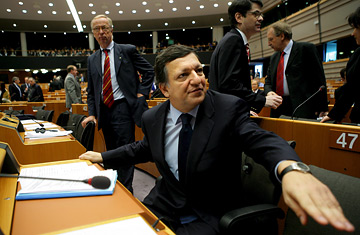
President Barroso in talks about combating climate change, improving EU's energy security and cutting carbon dioxide emissions by 2020.
The work of the European Union is often seen as technical, dull and remote: It's hard to gin up much general interest in, say, another green paper on financial regulation, however incisive it may be. But today's announcement in Brussels was a blockbuster: a sweeping package of measures to combat climate change that sets a global standard and means major changes for how Europe gets its energy.
"The struggle against climate change and the quest for secure, sustainable and competitive energy touches on every European, every day," said European Commission President José Manuel Barroso in announcing the ambitious plans. "This package is good for the planet, it's good for the European economy, and it's good for its citizens."
The plan could be remembered as the boldest E.U. initiative since the launch of the euro in 1999. It not only sets ambitious targets for the use of renewable energy, but would also force European companies to buy permits for greenhouse gas emissions. The plans are expected to cost the E.U. around $88 billion a year, and many European industries have already warned that the measures could force them to shut down.
But Barroso said the cost is low compared to the high price of inaction. "The longer we delay, the higher the costs of adaptation and mitigation," he said, adding that the overall price tag of the plan, at around 0.5% of E.U. gross domestic product, represented value for money over the long term. "This amounts to about three euros a week for everyone. A real commitment, but not a bad deal."
The package sets a framework for national laws that would slash Europe's overall emissions of carbon dioxide by 20% by 2020, compared to 1990 levels, and would ensure that 20% of Europe's energy by then comes from renewable sources like wind, solar and hydroelectric power. "Our proposals should reduce Europe's reliance on imported gas and oil by around 50 billion euros by 2020," explained Barroso. "These are figures with a real impact on our growth and prosperity."
Energy-intensive sectors such as aluminum, steel and cement have been vocal about their fears that they could lose business to countries with less stringent rules on carbon emissions. As a result, the plan raises the prospect of carbon tariffs on imports from countries that fail to sign up to a global climate change deal, such as the U.S. and China. "We want industry to remain in Europe. We don't want to export our jobs to other parts of the world," Barroso said.
Even before the measures were formally announced, Washington was casting the proposals as old-fashioned trade protectionism under the modern guise of mitigating climate change. "We have been dismayed at a variety of suggestions where we have seen the climate and the environment being used as an excuse to close markets," said U.S. trade representative Susan Schwab.
However, Barroso insisted that the E.U.'s ultimate goal was not to slap on trade sanctions, but to secure a worldwide agreement on cutting emissions. "This is about global warming, global climate change, not only climate change in Europe. We've got to put our proposals in such a way that we bring others with us," he said. The proposals, he said, would also give Europe more energy security and make it less dependent for supplies "on regimes that are not our friends."
The plans still have to be approved by the E.U.'s 27 governments and the European Parliament, and the Commission can expect resistance from rich E.U. member-states such as France and Germany, who will be asked to bear the brunt of the emissions-cutting targets. By contrast, new and poorer countries in central and eastern Europe will be allowed to increase their emissions by up to 20% from 2005 levels, reflecting their desire to catch up with the higher standard of living in western Europe.
Buffeted by industries, trading partners, key E.U. member states and even environmentalists, the plan is unlikely to emerge unscathed if and when it becomes law, which even under the most optimistic scenarios won't happen until 2009 at the earliest. But grasping the nettle now could pay off big down the line, Barroso says: "Europe can be the first economy for the low-carbon age."
